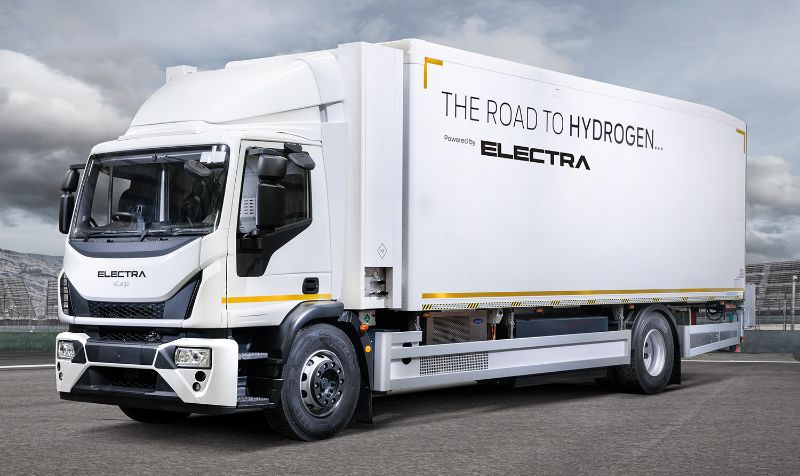Big Four grocer Sainsbury’s has successfully completed a hydrogen-powered HGV trial.
Read all about the outcome of the trial, how it contributes to Sainsbury’s long-term sustainability goals, and what it means for consumer products businesses like yours.
Sainsbury’s has kickstarted 2023 by reaching a significant sustainability milestone.
Working with electric vehicles (EV) company Electra, the British grocery giant has completed a three-month hydrogen delivery truck trial.
The Electric Vehicle Trial for Sainsburys
The trial saw Sainsbury’s use Electra’s 19-tonne, zero-emissions refrigerated truck to transport produce to stores across the country over a three-month period.
The Electra eCargo Fuel Cell Electric Vehicle carried out a typical daily return journey of 208 miles, with great success. Each day, an estimated 314kg of CO2 was saved as a result of using Electra’s EV in place of a diesel truck. This marks a huge step towards truly eco-friendly haulage!
While Sainsbury’s has no immediate plans to roll out these environmentally friendly HGVs yet, the results are not to be understated.
According to Sainsbury’s head of engineering and compliance, Gary King:
“Achieving zero carbon emissions for a regular haulage route is a significant initial step and will inform future decision making.”
With that in mind, it’s possible that zero-carbon supermarket delivery fleets might not be far off.
Sustainable supermarkets: Sainsbury’s Net Zero target
Sainsbury’s is among the most ambitious supermarkets when it comes to sustainability. In fact, it has the earliest Net Zero target of any of the UK Big Four supermarkets.
After pledging to be Net Zero by 2040, the grocer has since updated its pledge. Now, Sainsbury’s is committed to becoming Net Zero in its own operations by 2035. This aligns with the UN’s own target to limit global warming to 1.5 degrees.
Other UK retailers have made similar commitments to reach Net Zero by 2040.
As part of an initiative by British Retail Consortium, British supermarkets such as Sainsbury’s, Aldi, Lidl, Morrisons and Asda have committed to working together to hit the industry’s 2040 target.
They join the ranks of other retailers, including fashion, food, and personal care brands, as well as their suppliers and other stakeholders.
Sustainable supermarkets, sustainable products
A key element of the BRC’s Net Zero strategy? The decarbonisation of product sourcing and supply chains. According to their emissions overview:
“The extraction, primary production and processing of raw materials used in consumer goods frequently contributes the majority of supply chain greenhouse emissions.”
As such, it’s not just up to supermarkets like Sainsbury’s to make sustainability happen.
The products on British supermarket shelves will have to be more innovative, more responsibly sourced, and come through less wasteful supply chains if ambitious targets are to be hit.
Aligning with supermarket sustainability pledges
If you want your business to be a brand of choice for sustainably minded retailers, you’ll need the right people on your teams.
Experienced, forward-thinking people are essential in all areas of a consumer products business.
From marketing to national account management and all the way through to supply chain, you’ll need people who know how to push your business closer to carbon neutrality.
Work with a talent partner that understands the growing demands on your industry and how to position you as an employer of choice!
As consumer product recruitment experts, our specialty is engaging and attracting consumer goods talent with specialist sustainability knowledge. Stay ahead of the curve – get in touch today:
Call us: 0333 772 7200





